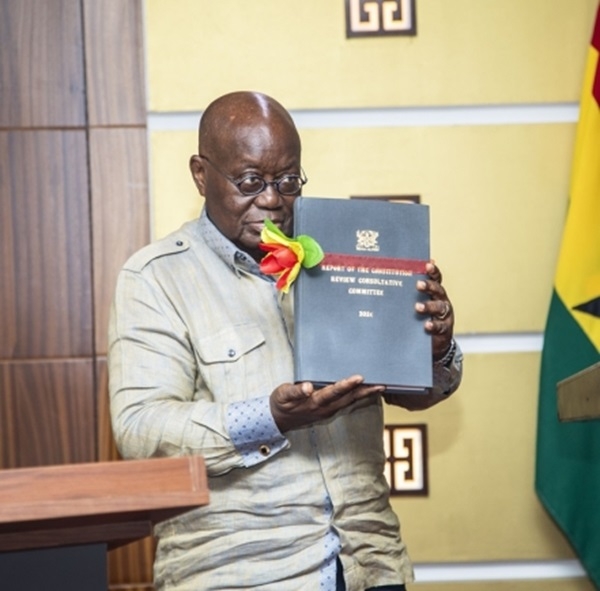CRCC seeks more biting powers for CHRAJ in report submitted to Akufo-Addo
 Akufo-Addo showcasing the report
Akufo-Addo showcasing the report
A Constitutional Review Consultative Committee(CRCC) has proposed significant amendments to empower the Commission on Human Rights and Administrative Justice (CHRAJ), reform the appointment processes for Independent Constitutional Bodies (ICBs), and revise constitutional immunity provisions.
Empowering CHRAJThe committee recommends amending Article 218(a) of the 1992 Constitution to enable CHRAJ to investigate complaints of human rights violations, corruption, and abuse of power without requiring a formal complainant.
The revised article would mandate CHRAJ to:
Investigate violations of fundamental rights and freedoms, corruption, abuse of power, and unfair treatment by public officers in their official duties. Examine public officers’ actions regarding alleged violations of fundamental human rights.The proposal seeks to expand CHRAJ's mandate, ensuring it can proactively address issues of injustice and misconduct.
Reforming ICB AppointmentsAddressing concerns about executive influence in the appointment of heads of Independent Commission Boards, the committee recommends an open, competitive process that includes parliamentary vetting and approval.
Successful candidates would then be appointed by the President.
This revised procedure would apply to key institutions, including the Electoral Commission, the National Commission on Civic Education (NCCE), and the Office of the Government Statistician.
The committee believes this process will enhance transparency and public confidence in these critical appointments.
Revising Constitutional ImmunityThe committee also reviewed Article 117, which grants constitutional immunity to certain public officials.
While stakeholders advocated for a complete revocation, the committee suggested a compromise: removing the word “arrest” from the provision’s title.
This adjustment aims to address public concerns while maintaining necessary protections for officials.
Broader ImplicationsThese proposed amendments reflect a commitment to strengthening governance, promoting accountability, and aligning constitutional provisions with contemporary democratic standards.
The recommendations, if implemented, are expected to enhance institutional independence and public trust in Ghana’s democratic framework.
The report is now subject to further review and approval processes, including potential parliamentary deliberations.
The CRCC is made up of institutional representation through a process where the various institutions freely and independently nominate persons to the Committee.
These institutions are:
(1) the Ministry of Justice and Attorney-General’s Department (MoJAGD),
(2) the Ministry of Parliamentary Affairs (MoPA),
(3) the Commission on Human Rights and Administrative Justice (CHRAJ),
(4) the National Commission on Civic Education (NCCE),
(5) the Audit Service,
(6) the National Development Planning Commission (NDPC),
(7) the Judicial Service,
(8) the Ghana Bar Association (GBA),
(9) the National Media Commission (NMC),
(10) the Parliamentary Service,
(11) the University of Ghana School of Law (UGSoL), and
(12) African Centre for Economic Transformation (ACET).
Source: Classfmonline.com/Cecil Mensah
Trending News

Dr. Siaw Agyepong spreads love on New Year's Day as over 4,000 people receive donations to enjoy festive seaon
11:04
#2024Polls: Ayikoi Otoo slams NPP's legal team for excluding NDC candidates in mandamus application
19:16
NPP MPs advocate for OPK’s inclusion in Minority's Whip team
09:46
#2024Polls: NDC frowns on EC's decision to re-run in Dome-Kwabenya
19:16
Ghana Fire Service douses inferno at Katamanto market
09:32
MTN Ghana Foundation presents hampers to babies born on 2024 Christmas Day in Volta Region
17:29
President-elect calls for prayers and unity to help address Ghana’s challenges
09:17
Appoint 'brutal’ OPK as Whip – Carlos Ahenkorah urges NPP leadership
17:15
10 junior police officers to re-file case against IGP
07:50
#2024 Polls: Supreme Court overturns re-collation results in Techiman South, Tema Central, 2 others
21:03




